
Top AI Solutions for Retail Omnichannel Support
Cut customer service costs by 90% while boosting retention to 89% with proven AI tools that work across all your sales channels.

Written by
Adam Stewart
Key Points
- Save 90% on support costs with AI phone answering vs live agents
- Boost customer spending 30% through connected omnichannel experiences
- Resolve 75% of customer issues instantly with smart automation
- Protect your business from $4.45M average data breach costs
Omnichannel retail strategies ensure customers enjoy a consistent shopping experience across all touchpoints - online, in-store, or via mobile. AI tools are now essential for managing these complex interactions, offering real-time data synchronization, personalized recommendations, and operational efficiency. With omnichannel customers spending up to 30% more and businesses with strong engagement achieving 89% customer retention, AI's role in retail is undeniable.
Key AI solutions for retail include:
- Dialzara: 24/7 AI-powered phone answering for order management and inquiries, saving up to 90% on costs.
- Crescendo.ai: AI for chat, email, and voice support, resolving 75% of interactions instantly.
- Zendesk AI Suite: Predictive automation for enterprise-level customer service.
- Yuma.ai: Post-purchase support automation for e-commerce.
- Lyro by Tidio: Fast conversational AI for customer queries.
- SAP Emarsys: AI-driven personalization for marketing across channels.
These tools streamline operations, cut costs, and improve customer satisfaction, making them invaluable for modern retail success. Below, we dive into their features, use cases, and benefits.
Key Features to Look for in AI Solutions for Retail
Selecting the best AI solution for your retail business means focusing on features that can enhance how you connect with customers across multiple channels. The right tools can reshape your operations and elevate the customer experience.
Real-Time Synchronization
Keeping your operations synchronized in real time is essential for smooth omnichannel retailing. A strong AI solution ensures that customer data, inventory updates, and interaction histories are instantly reflected across all platforms. For instance, if a customer adds an item to their cart on a mobile app, that action should immediately show up if they switch to a desktop or visit a store.
Advanced systems use automated pipelines to move data seamlessly. Look for solutions that integrate data from sources like POS systems, CRM platforms, online marketplaces, and supply chain tools into a unified system. Effective AI tools also clean and organize data automatically, removing duplicates and identifying irregularities. Machine learning can further enhance this process by spotting patterns or anomalies in real-time.
Consider the example of an outdoor clothing retailer with 20 locations. By deploying an AI-powered Click & Collect feature through ai.RETAIL, they saw 70% of their online sales driven by this option within four years. The feature not only boosted in-store foot traffic but also encouraged additional purchases during pickups. They also improved their website’s performance with AI, ensuring faster load times and synchronized inventory between online and physical stores.
The next step is integrating these real-time capabilities with your existing systems.
Integration with Retail Platforms
Your AI solution should work seamlessly with the systems you already have in place. The best options align data from multiple platforms into a single, consistent format that fits your organization’s needs.
AI-powered ETL (Extract, Transform, Load) processes simplify workflows by cleaning up records and delivering predictive insights. This reduces manual effort and minimizes errors during data transfer.
Retailers like Walmart and Zara highlight the potential of such integrations. Walmart’s generative AI search feature lets customers search for items based on scenarios - like “Super Bowl party supplies” - instead of specific product names. Zara, on the other hand, uses RFID-enabled "click & try" apps in its fitting rooms, allowing customers to request sizes or colors directly in-store.
Another example is Woolworths, which used Bloomreach Engagement and Content to create personalized app experiences. In just three months, they sent over 200,000 tailored SMS, push notifications, and emails. Similarly, boohooMAN achieved impressive results with AI-driven customer data tools, including a 5x ROI on SMS campaigns in the UK and a 25x ROI on birthday SMS campaigns.
"AI in retail is making retail more human, as automation enables employees to focus on higher-value-added activities like customer problem-solving and relationship building." – Intel
Once integrated, scalable automation becomes key to handling demand spikes.
Automation and Scalability
AI tools like chatbots, voice assistants, and automated workflows can handle increased customer inquiries without compromising service quality. These systems can answer routine questions, process orders, and escalate more complex issues to human agents when needed.
During high-demand periods, such as Black Friday, scalable AI ensures quick response times while continuously learning to improve interactions.
Take bimago, an interior design brand, as an example. By leveraging AI-powered personalization tools, bimago moved beyond basic A/B testing to deliver tailored experiences for each customer. This approach led to a 44% increase in conversion rates for users shown personalized banners compared to standard versions.
According to NVIDIA’s "State of AI in Retail and CPG 2025" report, AI has already improved decision-making for 43% of retailers, boosted employee productivity for 42%, and created operational efficiencies for another 42%.
Data Privacy and Compliance
Protecting customer data isn’t just about avoiding fines - it’s about earning trust. A solid AI system should comply with regulations like the California Consumer Privacy Act (CCPA) and other emerging privacy laws.
Privacy should be a core feature, with safeguards built into every stage of data handling - from collection to storage. Data breaches are costly, averaging $4.45 million per incident, with non-compliance adding nearly $220,000 to that cost. Beyond financial losses, 76% of consumers avoid businesses they don’t trust with their data, and 81% see data handling as a reflection of how much a company values its customers.
Your AI solution should include tools for managing user consent, fulfilling data requests, and securing information with measures like encryption and anonymization. Regular compliance checks and employee training can help keep your business aligned with evolving regulations.
Dialzara: AI Virtual Phone Answering for Retail
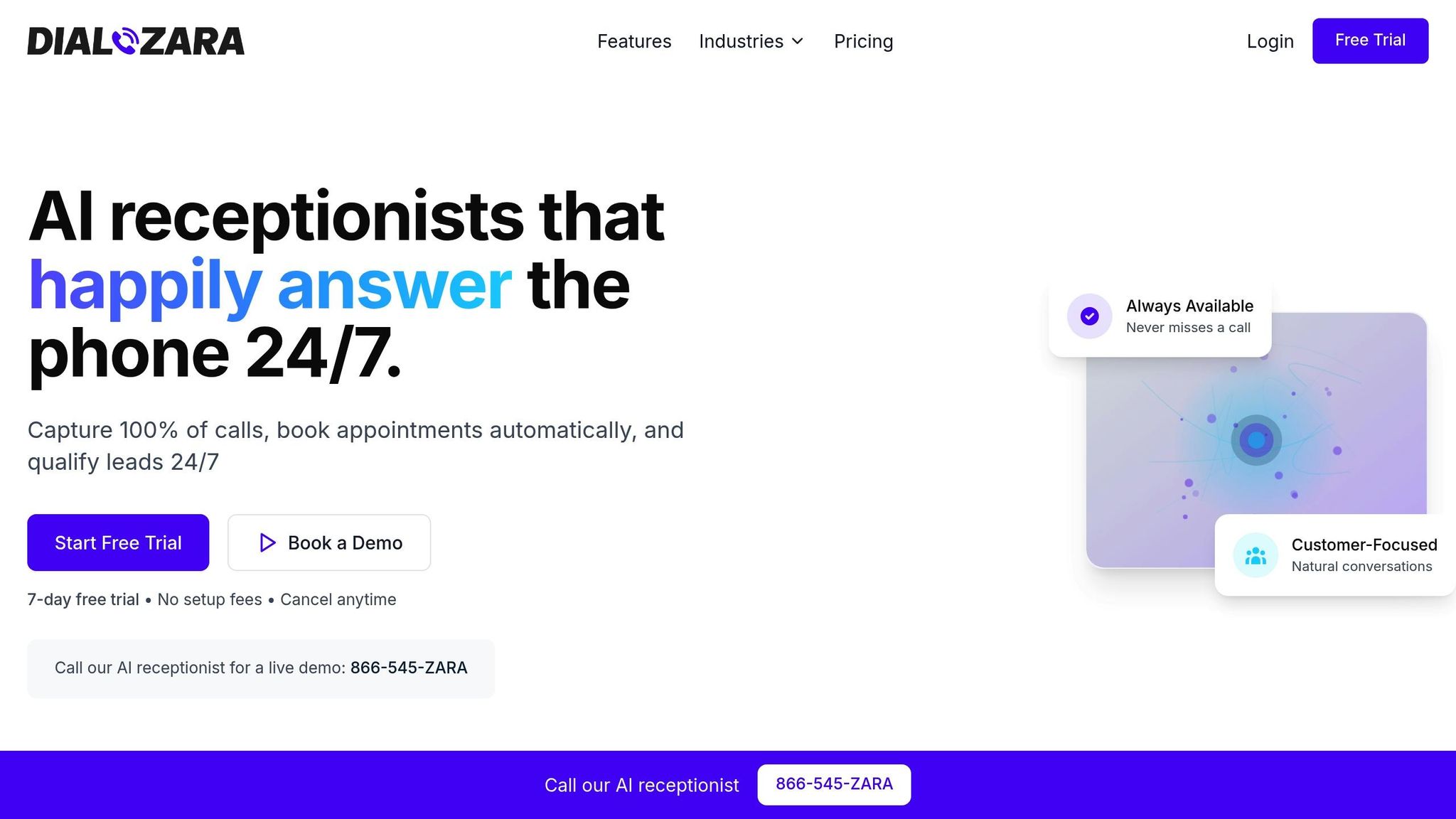
Phone calls remain a key connection point for retail businesses. Studies show that 60% of customers prefer to call local businesses after finding them online, yet only 38% of those calls are answered. Even more striking, 80% of callers don’t leave a voicemail. This creates a huge gap, leading to missed sales, lost appointments, and unhappy customers. Dialzara steps in to fill this gap with a smart, AI-driven solution.
Dialzara offers an AI-powered virtual phone answering service tailored specifically for small and medium-sized retail businesses. It’s quick to set up and integrates easily into your existing systems.
Key Features
Dialzara’s AI receptionist works around the clock, handling calls, booking appointments, gathering information, and routing calls to the right team - all without needing a human operator. Its realistic AI voice technology can even transfer calls when necessary, making it feel like a seamless extension of your team.
Setting it up is simple. Retailers create an account, answer a few questions to train the AI, upload any training documents or call scripts, pick a voice and phone number, and set up call forwarding. From there, the AI uses this information to build a custom prompt template tailored to the unique needs of the business.
Affordable and Efficient
Traditional live answering services can be expensive and difficult to scale, often charging high rates per call. Dialzara flips this model by offering its service for just $29 per month - saving businesses up to 90% on answering costs. There are no setup fees or hidden charges, and you can cancel anytime. Plus, the AI can handle growing call volumes effortlessly, ensuring consistent performance no matter the demand.
Perfect for Retail
Retailers often see a surge in phone calls during busy shopping seasons like Black Friday or the holidays. Dialzara automatically adjusts to handle these spikes, ensuring every customer gets prompt attention.
During these peak times, the AI manages inquiries about store hours, product availability, order tracking, returns, and appointments. It also qualifies leads and directs them to the right sales teams. All of this integrates smoothly with other digital channels, creating a consistent and unified customer experience.
On top of that, Dialzara prioritizes compliance with data protection standards, a critical feature for retail businesses that handle sensitive customer details like payment information.
For retail businesses aiming to strengthen their customer support without the complexity or cost of large-scale solutions, Dialzara provides a flexible, scalable option that grows alongside your business.
Other AI Solutions for Retail Omnichannel Support
AI platforms are transforming retail by creating smooth and connected customer experiences across various touchpoints. While tools like Dialzara focus on streamlining call management, other platforms address different aspects of the customer journey, ensuring a unified and efficient retail experience.
Crescendo.ai: Unified Customer Service
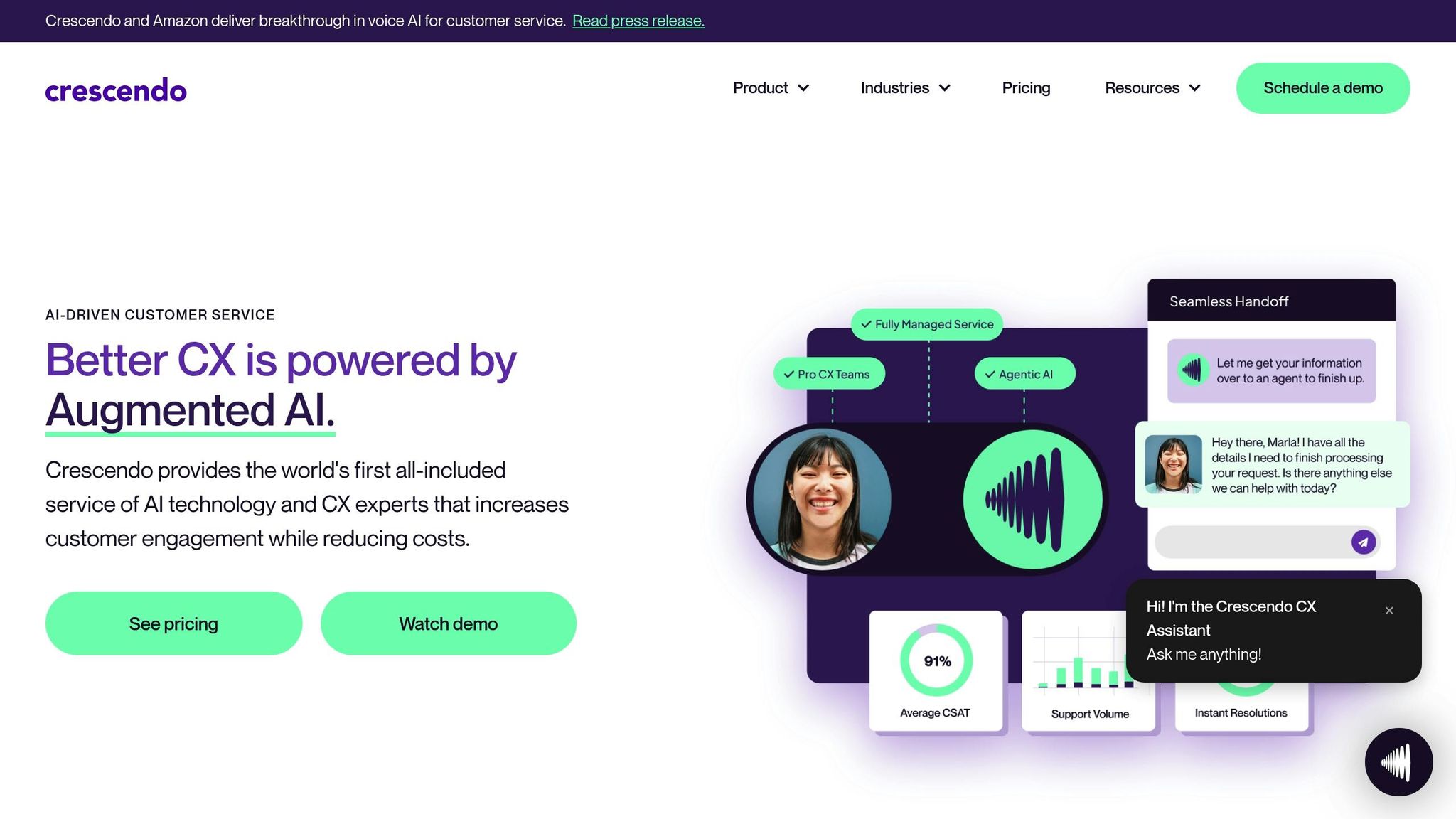
Crescendo.ai specializes in blending human expertise with AI across chat, email, and voice channels. The platform boasts an impressive ability to resolve 75% of customer interactions instantly, with an accuracy rate of 99.8% for AI-generated resolutions. Additionally, it can slash customer support costs by at least 20% from the outset. Its performance-based pricing model ensures businesses only pay based on actual results.
"It's been a game changer. The AI tools are unreal, and we now have a 24/7 sales workflow that qualifies leads and creates big opportunities for us." - Eric Knopf, CEO, Webconnex
Crescendo.ai is particularly well-suited for retailers facing seasonal shifts or spikes in demand, as it quickly adapts to changing business needs. This flexibility directly supports smooth omnichannel interactions.
Zendesk AI Suite: Predictive Automation
Zendesk's AI Suite is designed for enterprise-level customer service automation. Its AI agents can handle over 80% of interactions, leveraging predictive routing and intelligent reply suggestions. Plans start at $55 per agent per month, with optional add-ons available.
The platform has delivered tangible results. For example, in 2025, Tile used Zendesk to streamline customer interactions across preferred platforms, achieving a 40% reduction in average ticket handling time and a 14% boost in customer satisfaction. Similarly, Kaizen Gaming served over 1.4 million customers globally in 2017, reaching a 95% first-contact resolution rate and an 85% transactional satisfaction score. Zendesk excels in AI-powered triage, automatically tagging tickets based on intent, sentiment, and language, which facilitates efficient routing and quick responses to common queries.
Yuma.ai: E-Commerce Automation
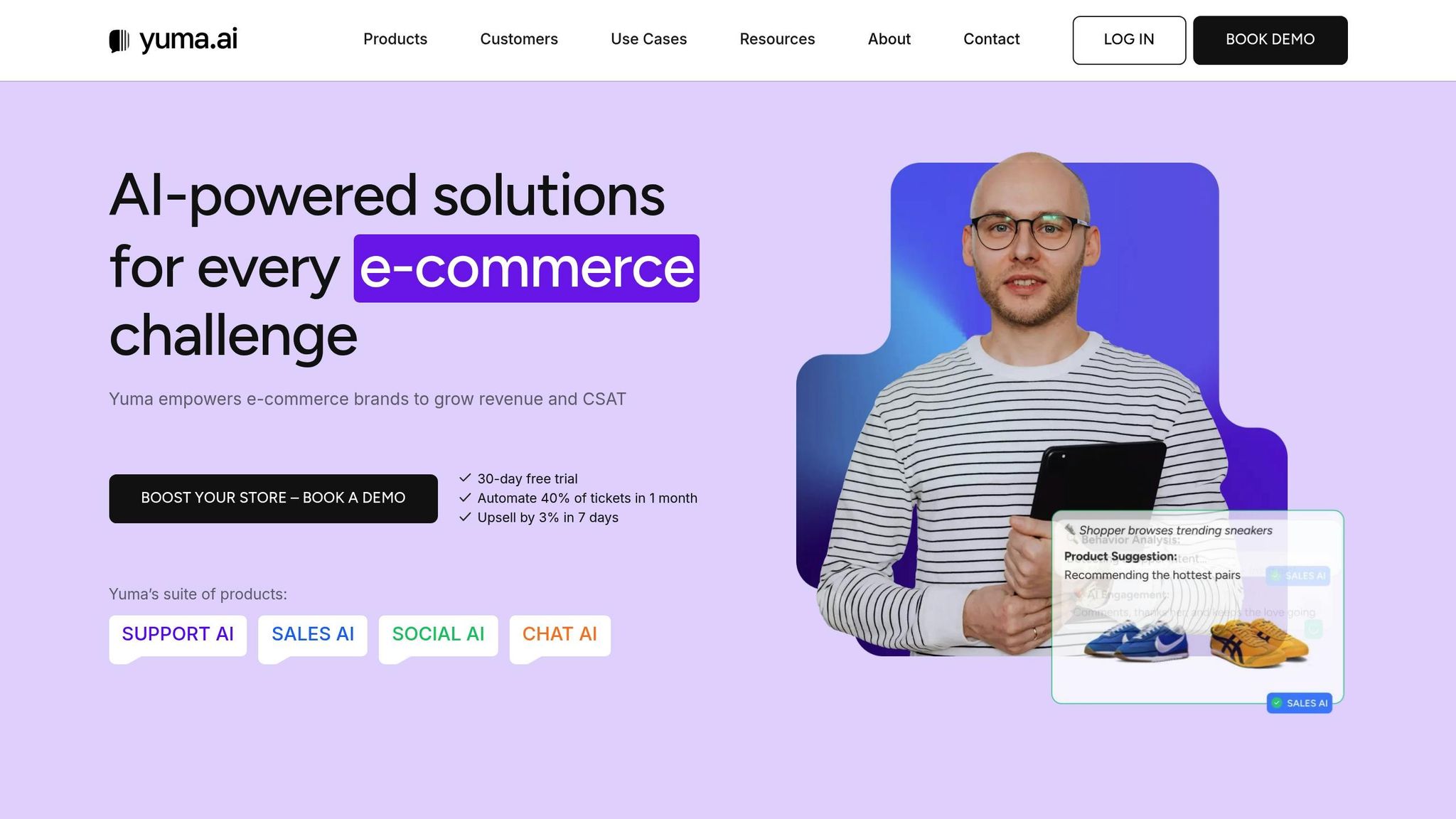
Yuma.ai focuses on automating post-purchase support for e-commerce businesses. It handles tasks like order inquiries, subscription management, and returns processing by integrating with popular e-commerce platforms. This allows it to access real-time order and inventory data, automating updates, shipping tracking, and return requests. For subscription-based businesses, Yuma.ai manages billing questions, plan adjustments, and pause requests effortlessly. Its specialization makes it a go-to solution for high-volume e-commerce operations where order-related issues dominate.
Lyro by Tidio: Conversational AI
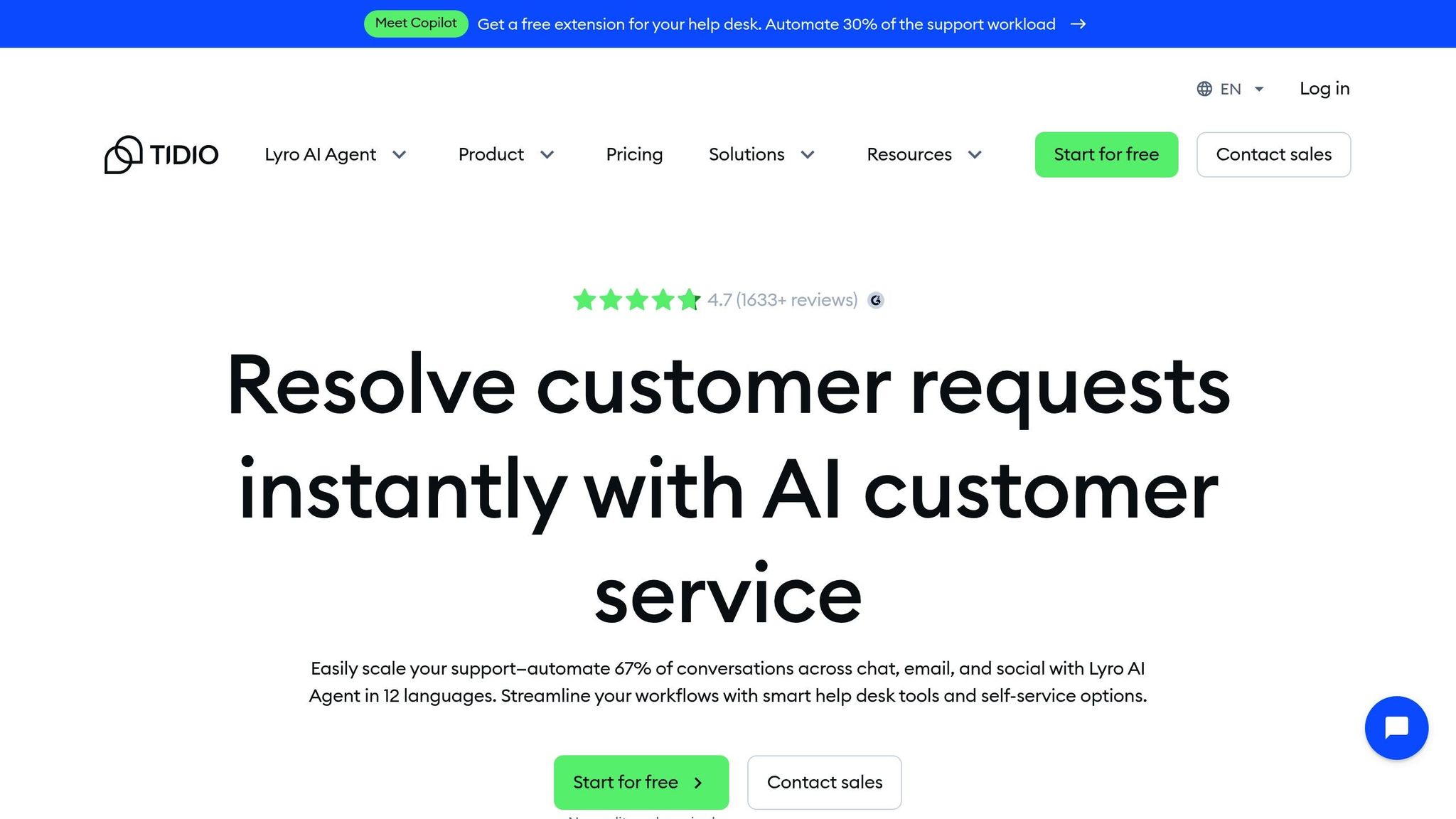
Lyro is designed to deliver lightning-fast responses, answering customer queries in less than 6 seconds. The platform automates up to 67% of interactions while maintaining accuracy by relying solely on company-provided data. Starting at $39 for 50 conversations after a free trial, Lyro is both accessible and efficient.
Its impact is evident across industries. For instance, Axioma achieved an 89% AI resolution rate for its car body repair services, while MattressNextDay saves over 400 hours each month through automated support. Suitor, a retail company, automated 85% of its customer service and reduced response times by 92%.
"The number one thing that has grown our business is offering that customer service experience the rest of the market has not been able to do." - Daniel Reid, Co-founder and CEO, Suitor
SAP Emarsys: AI-Driven Retail Personalization
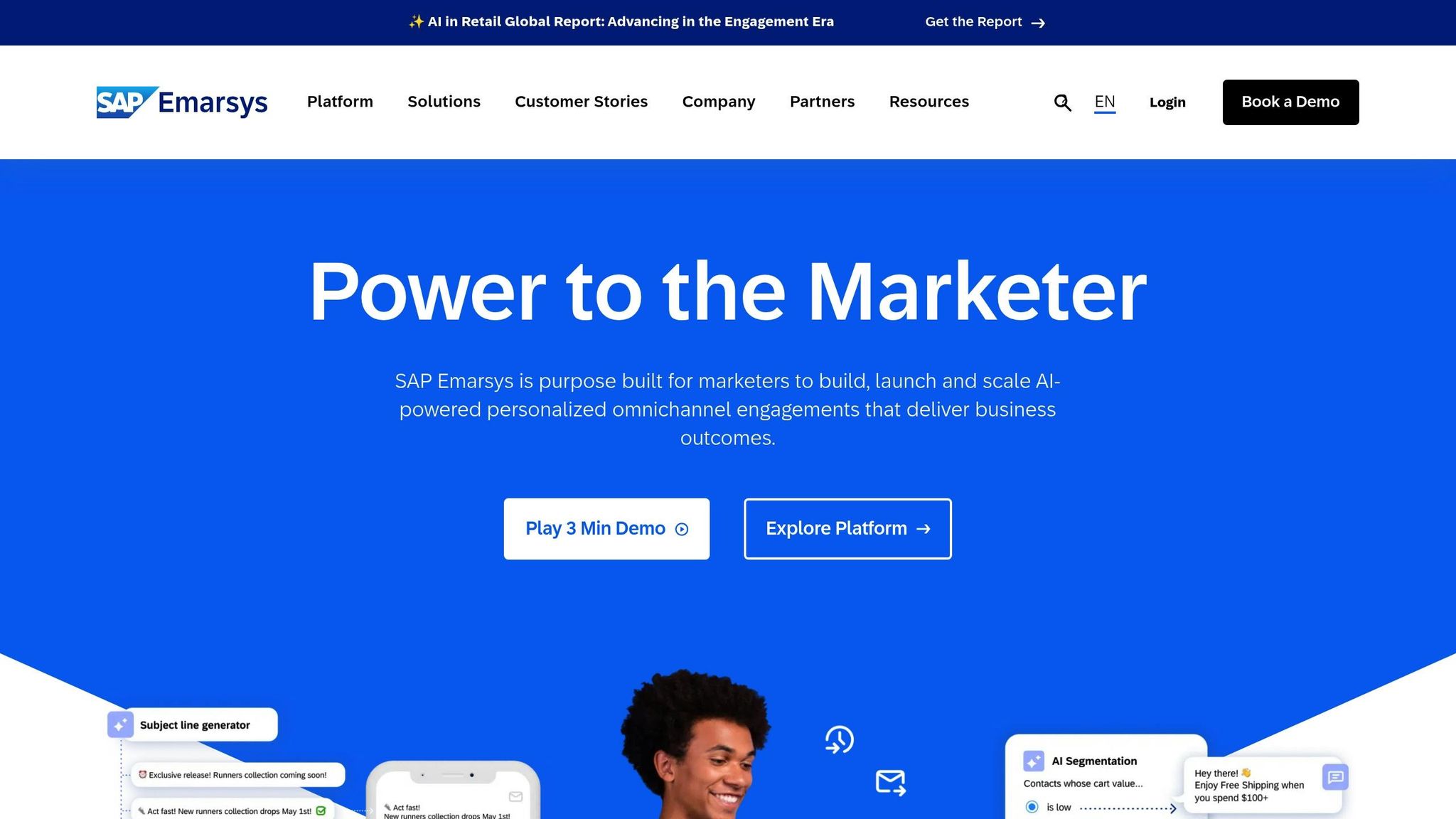
SAP Emarsys takes a marketing-centric approach, using AI to analyze customer behavior, purchase history, and preferences. This enables personalized experiences across all channels, ensuring consistent and relevant messaging whether customers are shopping online, browsing emails, or visiting physical stores. For retailers with complex customer journeys and diverse product offerings, SAP Emarsys provides the segmentation and automation tools needed to deliver tailored experiences on a large scale.
These platforms, each addressing specific retail challenges, complement tools like Dialzara by managing other facets of the customer journey. Together, they form a comprehensive suite of solutions to enhance omnichannel retail support.
sbb-itb-ef0082b
Comparison of AI Solutions
Expanding on the features discussed earlier, comparing AI solutions brings clarity to how each one addresses the unique demands of retail omnichannel operations. Key factors to consider include integration, scalability, and cost-efficiency.
Channel Focus and Specialization
Dialzara stands out for its strength in 24/7 phone-based support, effectively handling tasks like order management, returns, and customer inquiries without interruptions.
Integration and Technical Capabilities
A seamless integration process is crucial for smooth retail operations. Dialzara is built for quick deployment and integrates effortlessly with diverse software ecosystems, connecting with multiple business applications. Many AI tools in this space also utilize APIs and cloud-based platforms to synchronize customer data across channels in real time. This technical adaptability not only ensures smooth operations but also helps businesses manage costs more effectively as they scale.
In addition to technical integration, budget considerations further differentiate these AI solutions.
Cost Structure and Scalability
AI solutions vary in their pricing models, but Dialzara is particularly appealing for its ability to reduce costs by up to 90% compared to traditional staffing. Its quick setup and cost-saving design allow businesses to scale effortlessly during peak periods, ensuring both operational efficiency and enhanced customer engagement.
Retail-Specific Benefits
Retailers face distinct challenges, from personalizing customer interactions to streamlining operations. AI solutions tailored for retail can address these needs by improving customer value and driving engagement. For example, AI-driven demand forecasting can cut forecast errors by up to 30% and reduce stockouts by 40%. Additionally, 54% of marketers report higher brand engagement through effective omnichannel strategies.
Conclusion
When evaluating AI solutions, focus on key factors like scalability, integration, real-time data capabilities, security, automation, user experience, and cost-to-ROI. These elements are essential for delivering results that enhance both customer satisfaction and overall business performance.
Consider this: omnichannel customers are 30% more valuable, and 80% of consumers prefer businesses that provide personalized experiences. These numbers highlight why retailers need AI tools that ensure seamless, tailored interactions across every touchpoint. For instance, when it comes to phone-based support, Dialzara stands out by offering 24/7 availability while preserving the personal touch that retail customers expect. With 87% of shoppers who have used a GenAI tool reporting positive impacts on their shopping experiences, it’s clear that AI-powered customer service is not just accepted - it’s in demand.
To make the most of these tools, set clear ROI goals, employ A/B testing to measure effectiveness, and continuously refine your models. Metrics like revenue per visitor, conversion rate improvements, stockout rates, and cost-to-serve can serve as valuable indicators of success.
The future of retail lies in creating omnichannel experiences that not only anticipate customer needs but also provide instant, reliable support with consistent quality. By adopting AI solutions that integrate across all channels, retailers can turn reactive service interactions into proactive, relationship-building opportunities - fueling long-term growth and customer loyalty.
FAQs
How does AI, like Dialzara, improve customer experience in omnichannel retail?
AI tools like Dialzara are reshaping the way omnichannel retailers engage with customers by offering round-the-clock availability and smooth communication across multiple platforms. Thanks to its advanced AI voice technology, Dialzara provides interactions that feel natural and personalized, allowing businesses to handle increasing customer inquiries without compromising service quality.
Dialzara takes care of tasks such as answering calls, scheduling appointments, and relaying messages, which not only simplifies operations but also boosts customer satisfaction. Plus, with compatibility for over 5,000 business applications, it ensures your retail processes stay connected, consistent, and aligned with customer expectations - building trust and long-term loyalty.
What should retail businesses consider when integrating AI solutions into their existing systems for smooth operations?
To effectively incorporate AI into your retail systems, the first step is to confirm that the technology aligns with your current infrastructure. From there, craft a clear strategy that defines your objectives and highlights how AI can improve customer interactions. A strong focus on data management is essential - accurate insights and smooth operations depend on it.
Equally important is preparing your team. Whether through training or collaborating with experienced partners, ensure the AI solution is managed efficiently. Lastly, make compliance with data protection laws a top priority. Safeguarding customer data not only builds trust but also ensures your business operates responsibly. By tackling these areas, you can streamline processes and create a seamless omnichannel experience for your customers.
How do AI tools protect customer data and comply with retail regulations?
AI tools play a critical role in protecting customer data and ensuring adherence to legal and regulatory standards. By leveraging technologies like machine learning and natural language processing, these systems can securely handle sensitive information, drastically reducing the chances of human error.
These tools are built to comply with major regulations, including GDPR and U.S. privacy laws, ensuring data remains secure and confidential. They also help maintain customer trust by consistently monitoring and adapting to changing legal requirements, allowing retail businesses to stay aligned with the latest standards.
Summarize with AI
Related Posts
Shopify AI Tools for Customer Support
Explore how AI tools can transform Shopify customer support, offering 24/7 assistance, cost savings, and streamlined communication.
AI in Omnichannel Contact Centers: 5 Ways It Transforms CX
Discover how AI is transforming customer experiences in omnichannel contact centers through personalized interactions, efficient self-service, and continuous improvement.
How AI Chatbots Improve Multichannel E-commerce Support
Explore how AI chatbots revolutionize multichannel e-commerce support by enhancing customer service efficiency and reducing operational costs.
AI Voice Assistants in Retail: How They Work
Explore how AI voice assistants enhance retail by personalizing shopping experiences, improving efficiency, and balancing automation with human support.
